医学英文论文写作U6-Discussion
医疗卫生英语六级作文
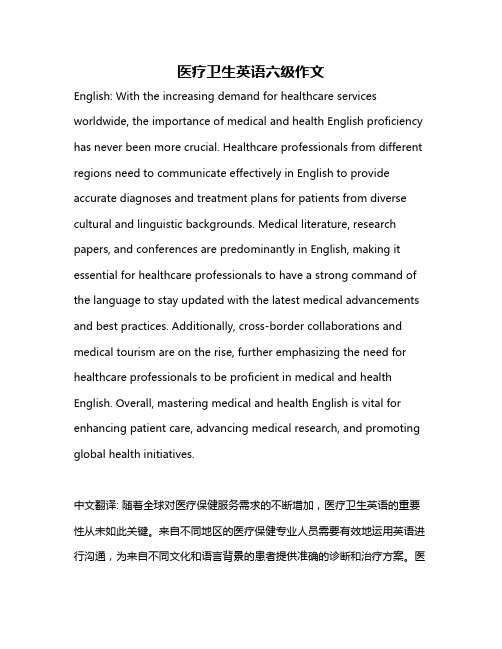
医疗卫生英语六级作文English: With the increasing demand for healthcare services worldwide, the importance of medical and health English proficiency has never been more crucial. Healthcare professionals from different regions need to communicate effectively in English to provide accurate diagnoses and treatment plans for patients from diverse cultural and linguistic backgrounds. Medical literature, research papers, and conferences are predominantly in English, making it essential for healthcare professionals to have a strong command of the language to stay updated with the latest medical advancements and best practices. Additionally, cross-border collaborations and medical tourism are on the rise, further emphasizing the need for healthcare professionals to be proficient in medical and health English. Overall, mastering medical and health English is vital for enhancing patient care, advancing medical research, and promoting global health initiatives.中文翻译: 随着全球对医疗保健服务需求的不断增加,医疗卫生英语的重要性从未如此关键。
医学相关话题的六级英语作文
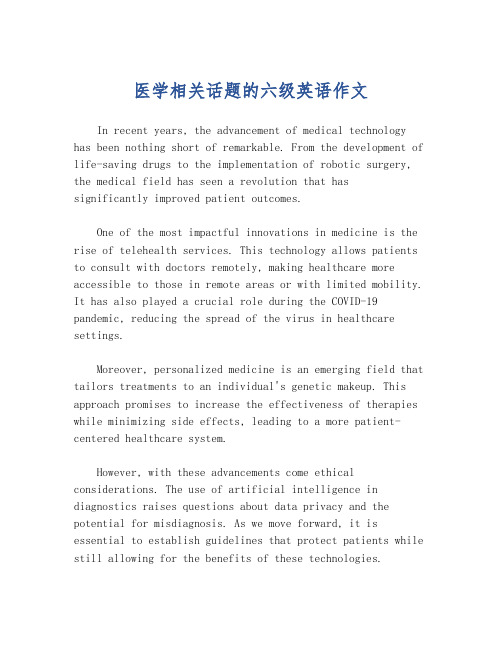
医学相关话题的六级英语作文In recent years, the advancement of medical technology has been nothing short of remarkable. From the development of life-saving drugs to the implementation of robotic surgery, the medical field has seen a revolution that hassignificantly improved patient outcomes.One of the most impactful innovations in medicine is the rise of telehealth services. This technology allows patients to consult with doctors remotely, making healthcare more accessible to those in remote areas or with limited mobility. It has also played a crucial role during the COVID-19 pandemic, reducing the spread of the virus in healthcare settings.Moreover, personalized medicine is an emerging field that tailors treatments to an individual's genetic makeup. This approach promises to increase the effectiveness of therapies while minimizing side effects, leading to a more patient-centered healthcare system.However, with these advancements come ethical considerations. The use of artificial intelligence in diagnostics raises questions about data privacy and the potential for misdiagnosis. As we move forward, it is essential to establish guidelines that protect patients while still allowing for the benefits of these technologies.Another critical issue is the accessibility of medical care. While technology has improved the quality of healthcare, it has also increased its cost. Ensuring that everyone can benefit from these advancements, regardless of their economic status, is a challenge that must be addressed.Lastly, the role of education in medicine cannot be overstated. As new technologies and treatments emerge, it is crucial that medical professionals are well-informed and trained to use them effectively. This includes not onlydoctors and nurses but also support staff and administrators.In conclusion, the future of medicine is bright but not without its challenges. By addressing these issues proactively, we can ensure that the benefits of medical advancements are shared by all, leading to a healthier and more equitable society.。
学术英语医学Unit6分析解析
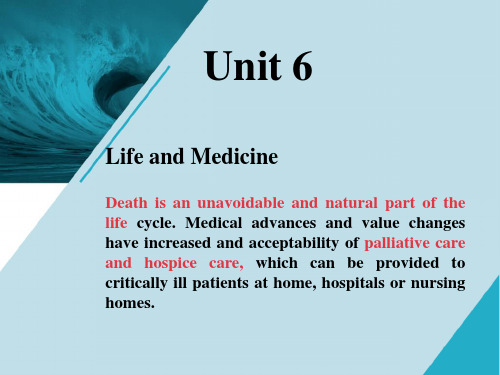
• Suggested answers
• Congestive: hyperemic • Disinfect: 除去(感染),给…消毒
• Chlorine is used to disinfect water.
– 氯用来给水消毒。
• Palliate: to palliate a disease • Dialysis or kidney dialysis is a method of
special equipment (like a hospital bed or bedside commode) • Health insurance • Planning by a professional, such as a hospital discharge planner or a social worker • Help from local governmental agencies • Doctor supervision at home
Unit 6 Life and Medicine
Text A
Critical reading and thinking
Topics for presentation
6 How has the meaning of palliative care changed?
Knowledge of the subject matter
Unit 6 Life and Medicine
Text A
Critical reading and thinking
Topics for presentation
5 How has the meaning of palliative care changed?
医学英文论文写作U6-Discussion

Step Four of Move 2
●
Our findings are similar to those of Tanaka
et al., who observed that ...
●
The present study differs from previous
studies including...
●
Permanent implantation of electrodes was thus necessary to achieve reproducible recordings in our study.
Step Four of Move 2
It compares and contrasts our new
It is a reiteration of the main observations. It is an explicit statement of the significance
of the results.
It justifies the results by confirming that the
methods were appropriate to the research question.
It compares and contrasts our new results
with those of previous studies.
It discusses the limitations in our paper and
results with those of previous studies.
It is often introduced with a very
医学论文英文发言稿范文

Ladies and Gentlemen,Good morning/afternoon. Today, I am honored to present a systematic review on the impact of telemedicine on access to healthcare. As we navigate through the digital era, telemedicine has emerged as a revolutionary tool that has the potential to transform the healthcare landscape. In this presentation, I will discuss the findings of our comprehensive review and highlight the key insights.Introduction:Access to healthcare is a fundamental human right, yet millions of people worldwide still face barriers in receiving timely and appropriate medical care. These barriers include geographical distance, lack of transportation, financial constraints, and limited healthcare resources. Telemedicine, or telehealth, offers a promising solution to these challenges by leveraging technology to provide medical services remotely.Methodology:Our systematic review aimed to evaluate the impact of telemedicine on access to healthcare. We conducted a thorough search of relevant literature, including peer-reviewed articles, grey literature, andpolicy documents, published between 2010 and 2021. The search was conducted using electronic databases, such as PubMed, Scopus, and Web of Science. We followed the PRISMA guidelines to ensure the quality of our review.Results:Our review identified 42 studies that met the inclusion criteria. The studies covered various aspects of telemedicine, including its impact on access to primary care, mental health services, and specialist consultations. The key findings are as follows:1. Telemedicine has significantly improved access to healthcare for individuals living in remote areas. Patients in rural regions can now consult with specialists without the need to travel long distances, saving time and resources.2. Telemedicine has helped to reduce the disparities in access to mental health services. Patients with mental health conditions can now receive timely interventions and support from mental health professionals, regardless of their location.3. Telemedicine has facilitated access to specialist consultations for patients with chronic conditions. This has enabled early detection and management of complications, leading to better health outcomes.4. However, there are challenges associated with telemedicine that need to be addressed. These include issues related to internet connectivity, privacy, and data security. Additionally, there is a need for standardization of telemedicine services to ensure quality and consistency.Discussion:The findings of our review suggest that telemedicine has the potential to significantly improve access to healthcare. However, the benefits of telemedicine are not without limitations. The challenges associated with telemedicine, as identified in our review, need to be addressed to maximize its potential. Some recommendations include:1. Ensuring equitable access to telemedicine services by improving internet infrastructure in underserved areas.2. Developing policies and regulations to protect patient privacy and data security.3. Standardizing telemedicine practices to ensure quality and consistency of care.4. Training healthcare professionals to adapt to telemedicine and provide effective remote care.Conclusion:In conclusion, our systematic review demonstrates that telemedicine has a significant impact on access to healthcare. By leveraging technology, telemedicine can help overcome geographical, financial, and logisticalbarriers that prevent individuals from receiving timely and appropriate medical care. As we continue to advance in the digital age, it iscrucial to address the challenges associated with telemedicine to maximize its potential and ensure equitable access to healthcare for all.Thank you for your attention. I am now open to any questions you may have regarding our findings and recommendations.[Your Name]。
关于医学英语的作文
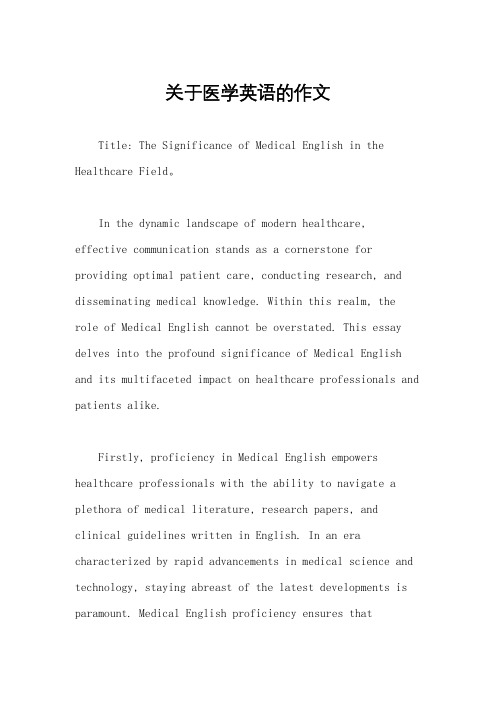
关于医学英语的作文Title: The Significance of Medical English in the Healthcare Field。
In the dynamic landscape of modern healthcare,effective communication stands as a cornerstone for providing optimal patient care, conducting research, and disseminating medical knowledge. Within this realm, therole of Medical English cannot be overstated. This essay delves into the profound significance of Medical English and its multifaceted impact on healthcare professionals and patients alike.Firstly, proficiency in Medical English empowers healthcare professionals with the ability to navigate a plethora of medical literature, research papers, andclinical guidelines written in English. In an era characterized by rapid advancements in medical science and technology, staying abreast of the latest developments is paramount. Medical English proficiency ensures thathealthcare professionals can comprehend and critically evaluate scholarly articles, thereby enriching theirclinical practice and decision-making processes.Moreover, Medical English serves as a universal language in the global healthcare community. With the proliferation of international collaborations, conferences, and research endeavors, effective communication among healthcare professionals transcends geographical boundaries. English proficiency facilitates seamless exchange of ideas, expertise, and best practices, fostering innovation and advancements in patient care on a global scale.Furthermore, for healthcare professionals hailing from non-English speaking backgrounds, proficiency in Medical English enhances career opportunities and professional mobility. Many prestigious medical institutions and academic journals require submissions and presentations in English, making proficiency in the language a prerequisite for career advancement and recognition on an international level. Additionally, proficiency in Medical English augments one's competitiveness in the global job market,opening doors to diverse career opportunities and collaborations across borders.Beyond the realm of academia and professional advancement, Medical English plays a pivotal role inpatient care and advocacy. Effective communication between healthcare providers and patients is indispensable for fostering trust, understanding, and adherence to treatment plans. In multicultural societies, where patients hail from diverse linguistic and cultural backgrounds, Medical English serves as a common medium for conveying medical information and ensuring patient comprehension. Moreover, proficiency in Medical English enables healthcare providers to engage in meaningful dialogue with patients, addressing their concerns, preferences, and cultural nuances with sensitivity and empathy.In addition to its instrumental role in clinical practice and research, Medical English proficiency holds profound implications for healthcare policy and public health initiatives. English serves as the lingua franca of global health organizations, such as the World HealthOrganization (WHO) and the Centers for Disease Control and Prevention (CDC), which disseminate vital information, guidelines, and recommendations to address global health challenges. Healthcare professionals proficient in Medical English are better equipped to access and contribute to these resources, thereby playing an active role in shaping healthcare policies and interventions on a global scale.In conclusion, Medical English stands as an indispensable tool in the arsenal of healthcare professionals, facilitating effective communication, collaboration, and knowledge exchange in the pursuit of optimal patient care and scientific advancement. Proficiency in Medical English not only enhances career prospects and professional mobility but also fosters cultural competence, empathy, and patient-centered care. As the healthcare landscape continues to evolve in an increasingly interconnected world, the importance of Medical English proficiency cannot be overstated. It is not merely a language skill but a gateway to excellence in healthcare delivery and a catalyst for positive change in the lives of patients worldwide.。
医学人文英语第三版下册u6作文
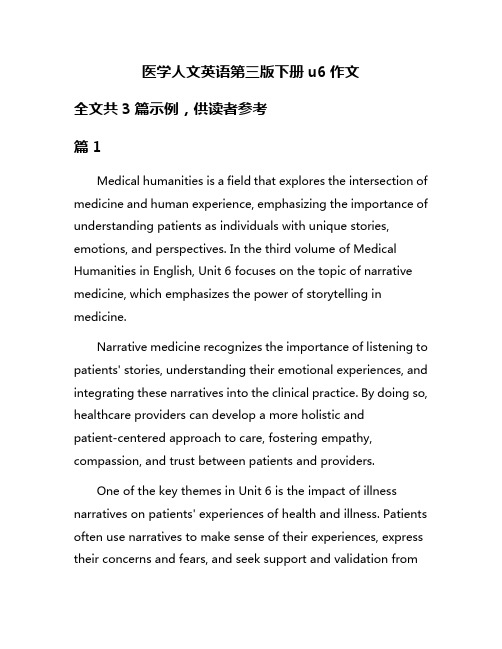
医学人文英语第三版下册u6作文全文共3篇示例,供读者参考篇1Medical humanities is a field that explores the intersection of medicine and human experience, emphasizing the importance of understanding patients as individuals with unique stories, emotions, and perspectives. In the third volume of Medical Humanities in English, Unit 6 focuses on the topic of narrative medicine, which emphasizes the power of storytelling in medicine.Narrative medicine recognizes the importance of listening to patients' stories, understanding their emotional experiences, and integrating these narratives into the clinical practice. By doing so, healthcare providers can develop a more holistic andpatient-centered approach to care, fostering empathy, compassion, and trust between patients and providers.One of the key themes in Unit 6 is the impact of illness narratives on patients' experiences of health and illness. Patients often use narratives to make sense of their experiences, express their concerns and fears, and seek support and validation fromhealthcare providers. By listening attentively to these narratives, providers can gain insights into patients' beliefs, values, and priorities, which can inform their treatment decisions and improve patient outcomes.Another important aspect of narrative medicine is the use of reflective writing and storytelling as a tool for personal and professional development. Healthcare providers can use writing and storytelling to reflect on their own experiences, emotions, and challenges, gaining insight into their own biases, limitations, and strengths. By engaging in self-reflection and sharing their stories with colleagues, providers can enhance their communication skills, empathy, and resilience, ultimately improving the quality of care they provide to patients.In addition, Unit 6 explores the ethical considerations of narrative medicine, such as the importance of respecting patients' autonomy, confidentiality, and privacy when sharing their stories. Healthcare providers must ensure that patients feel comfortable and empowered to disclose their narratives, without fear of judgment or exploitation. By upholding ethical principles and values, providers can build trusting relationships with patients, fostering a therapeutic alliance that is essential for effective communication and collaboration in healthcare.Overall, Unit 6 of Medical Humanities in English highlights the transformative power of narrative medicine in healthcare, emphasizing the importance of storytelling in promoting empathy, understanding, and healing. By integrating narrative approaches into clinical practice, healthcare providers can enhance the patient-provider relationship, improve patient outcomes, and foster a more compassionate and humanistic healthcare system. As healthcare professionals, it is essential to recognize the value of patients' stories, listen with an open heart and mind, and honor the humanity of each individual we care for.篇2Humanistic Care in Medical PracticeIntroductionAs medical professionals, it is not enough to simply possess the technical knowledge and skills to diagnose and treat patients. In addition to the medical aspect of healthcare, it is crucial for healthcare providers to also incorporate humanistic care into their practice. Humanistic care focuses on the emotional, psychological, and social needs of patients, recognizing them as individuals with unique experiences and feelings. In this essay, we will explore the importance of humanistic care in medicalpractice and discuss how it can improve patient outcomes and overall healthcare delivery.Importance of Humanistic CareHumanistic care is important in medical practice for several reasons. First and foremost, it helps build trust and rapport between healthcare providers and patients. By showing empathy, compassion, and respect towards patients, healthcare providers can create a supportive and trusting environment in which patients feel comfortable sharing their concerns and seeking help. This, in turn, can improve patient satisfaction and compliance with treatment plans.Secondly, humanistic care contributes to better clinical outcomes. Research has shown that patients who receive humanistic care are more likely to adhere to treatment regimens, experience less pain and anxiety, and have faster recovery times. This is because when patients feel understood and supported by their healthcare providers, they are more likely to actively participate in their own care and take steps to improve their health.Furthermore, humanistic care is essential for addressing the emotional and psychological needs of patients. Illness and injury can have a profound impact on a person's mental well-being,leading to feelings of fear, anxiety, and depression. By providing emotional support, reassurance, and counseling, healthcare providers can help patients cope with their emotions and build resilience in the face of adversity.Practical Strategies for Incorporating Humanistic CareThere are several practical strategies that healthcare providers can use to incorporate humanistic care into their practice. Firstly, active listening is key. By listening attentively to patients and acknowledging their concerns, healthcare providers can show that they care about the patient as a whole person, not just as a set of symptoms or a disease.Secondly, healthcare providers should practice cultural sensitivity and respect diversity. Patients come from a variety of cultural backgrounds, each with its own beliefs, values, and practices. By respecting and understanding these differences, healthcare providers can ensure that care is tailored to meet the individual needs of each patient.Thirdly, empathy and compassion are essential components of humanistic care. Healthcare providers should strive to understand the patient's perspective, show empathy for their emotions, and offer words of comfort and support. By connecting with patients on an emotional level, healthcareproviders can build trust and strengthen the therapeutic relationship.Finally, healthcare providers should involve patients in decision-making regarding their care. By empowering patients to participate in their own treatment plans, healthcare providers can promote autonomy and encourage patients to take an active role in managing their health.ConclusionIn conclusion, humanistic care is an essential component of medical practice that focuses on the emotional, psychological, and social needs of patients. By incorporating humanistic care into their practice, healthcare providers can build trust and rapport with patients, improve clinical outcomes, and address the emotional needs of patients. Through active listening, cultural sensitivity, empathy, and patient empowerment, healthcare providers can provide holistic care that treats the patient as a whole person, not just a set of symptoms. Ultimately, humanistic care is about recognizing the humanity in healthcare and striving to create a compassionate and supportive environment for patients to heal and thrive.篇3The Importance of Medical Humanities in HealthcareIntroductionThe field of medicine has advanced significantly over the years, with groundbreaking technological innovations, specialized treatments, and cutting-edge research. However, in the midst of all these advancements, it is important not to overlook the human aspect of healthcare. This is where medical humanities come into play – the integration of humanities disciplines like literature, philosophy, ethics, and history into medical education and practice. In this essay, we will explore the significance of medical humanities in enhancing patient care and the overall healthcare system.Empathy and CompassionOne of the key benefits of incorporating medical humanities into healthcare is the cultivation of empathy and compassion among healthcare professionals. By studying literature, for example, medical students can learn to appreciate the human experience, understand different perspectives, and develop a greater sense of empathy towards their patients. This can lead to improved communication, better patient-provider relationships, and ultimately, better health outcomes.Ethical Decision-MakingMedical humanities also play a crucial role in helping healthcare professionals navigate complex ethical issues that arise in the field of medicine. By studying ethics and philosophy, medical students can develop critical thinking skills, moral reasoning, and a deeper understanding of the ethical dilemmas they may face in their practice. This can help them make informed and morally sound decisions that prioritize thewell-being of their patients.Cultural CompetenceIn today's diverse and multicultural society, it is essential for healthcare professionals to be culturally competent and sensitive to the needs and beliefs of patients from different backgrounds. Medical humanities provide a platform for exploring cultural diversity, understanding the social determinants of health, and promoting inclusivity in healthcare settings. This can help healthcare professionals deliver more effective andpatient-centered care that respects the values and preferences of individuals from diverse communities.Narrative MedicineAnother important aspect of medical humanities is narrative medicine, which emphasizes the power of storytelling in healthcare. By listening to and reflecting on patients' stories, healthcare professionals can gain valuable insights into their experiences, emotions, and values. This can humanize the healthcare experience, foster trust and rapport between patients and providers, and enable a more holistic approach to patient care that takes into account the patient's unique narrative and context.Professional Well-BeingLastly, medical humanities can also benefit healthcare professionals themselves by enhancing their well-being and resilience in the face of the challenges and stresses of the healthcare environment. Studying humanities disciplines like literature and art can provide a source of meaning, inspiration, and self-care for healthcare professionals, helping them cope with burnout, moral distress, and emotional exhaustion. This can ultimately promote a healthier and more sustainable work environment that prioritizes the well-being of both patients and providers.ConclusionIn conclusion, medical humanities play a vital role in enhancing patient care, promoting ethical decision-making, fostering cultural competence, and supporting the well-being of healthcare professionals. By integrating humanities disciplines into medical education and practice, we can create a more humane, empathetic, and patient-centered healthcare system that values the human aspect of medicine alongside technological advancements. As we continue to advance in the field of healthcare, let us not forget the importance of the human touch and the power of the humanities to enrich our understanding and practice of medicine.。
医学方面英语作文模板

医学方面英语作文模板Title: Medical English Writing Template。
Introduction。
Medical English writing is an essential skill for healthcare professionals, researchers, and students in the medical field. Whether it's writing research papers, case reports, or patient records, clear and effective communication is crucial. This article will provide a template for writing medical English that can be applied to various types of medical writing.Section 1: Title and Abstract。
The title of the article should be concise and informative, clearly indicating the topic of the research or report. The abstract should provide a brief summary of the main findings or content of the article, including the research question, methods, results, and conclusions. It should be written in a clear and concise manner, allowing readers to quickly grasp the essence of the article.Section 2: Introduction。
医学专业英文作文
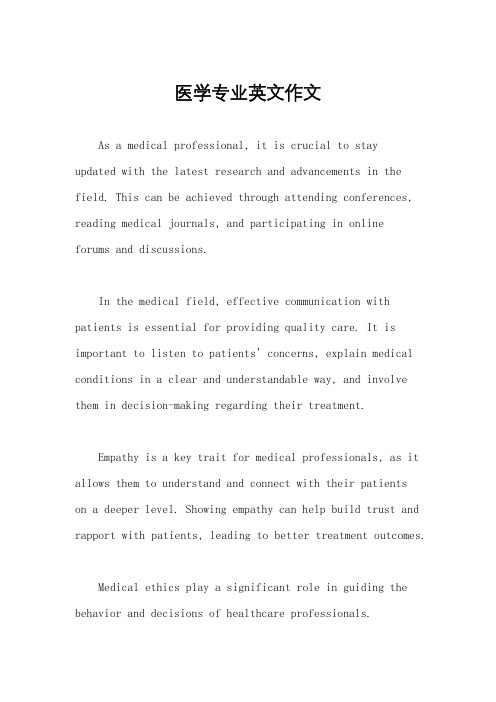
医学专业英文作文As a medical professional, it is crucial to stayupdated with the latest research and advancements in the field. This can be achieved through attending conferences, reading medical journals, and participating in onlineforums and discussions.In the medical field, effective communication with patients is essential for providing quality care. It is important to listen to patients' concerns, explain medical conditions in a clear and understandable way, and involve them in decision-making regarding their treatment.Empathy is a key trait for medical professionals, as it allows them to understand and connect with their patientson a deeper level. Showing empathy can help build trust and rapport with patients, leading to better treatment outcomes.Medical ethics play a significant role in guiding the behavior and decisions of healthcare professionals.Upholding ethical principles such as respect for patient autonomy, confidentiality, and beneficence is essential for maintaining trust and integrity in the medical profession.Continuous professional development is necessary for medical professionals to enhance their knowledge and skills. This can be achieved through pursuing further education, attending workshops and training programs, and seeking mentorship from experienced colleagues.Teamwork is vital in the medical field, as it allowsfor collaboration and coordination among healthcare professionals to provide comprehensive care for patients. Effective teamwork involves clear communication, mutual respect, and a shared commitment to patient well-being.In the rapidly evolving field of medicine, adaptability is crucial for medical professionals to stay abreast of new technologies and treatment modalities. Being open to change and willing to learn new approaches can improve patientcare and outcomes.Patient advocacy is an important aspect of the medical profession, as it involves speaking up for patients' rights and ensuring they receive the best possible care. Advocacy may involve addressing issues such as access to healthcare, informed consent, and quality of care.Cultural competence is essential for medical professionals to effectively interact with patients from diverse backgrounds. Understanding and respecting cultural differences can help avoid misunderstandings and improve the overall patient experience.Self-care is imperative for medical professionals to prevent burnout and maintain their well-being. This includes prioritizing work-life balance, seeking support when needed, and engaging in activities that promote physical and mental health.。
如何写英文医学综述作文
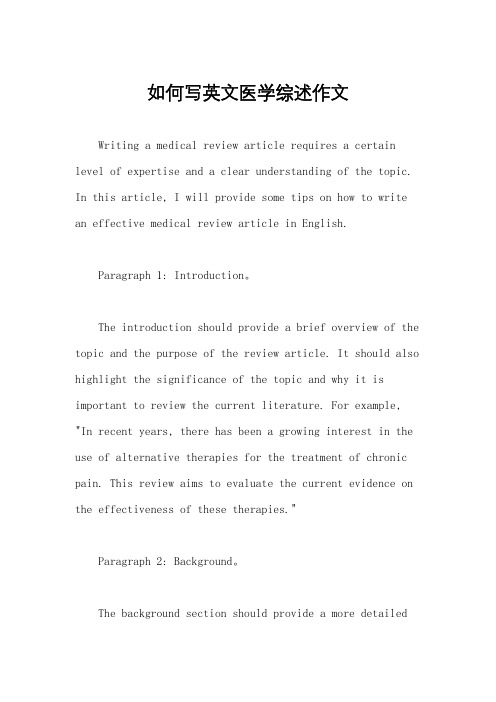
如何写英文医学综述作文Writing a medical review article requires a certain level of expertise and a clear understanding of the topic. In this article, I will provide some tips on how to write an effective medical review article in English.Paragraph 1: Introduction。
The introduction should provide a brief overview of the topic and the purpose of the review article. It should also highlight the significance of the topic and why it is important to review the current literature. For example, "In recent years, there has been a growing interest in the use of alternative therapies for the treatment of chronic pain. This review aims to evaluate the current evidence on the effectiveness of these therapies."Paragraph 2: Background。
The background section should provide a more detailedexplanation of the topic, including its history, prevalence, and current state of research. This section can also highlight any controversies or gaps in the literature. For example, "Chronic pain affects millions of people worldwide and is a major cause of disability. While traditional pharmacological therapies can be effective, they also have significant side effects. As a result, many patients are turning to alternative therapies, such as acupuncture and herbal medicine. However, the efficacy of these therapiesis still controversial and requires further investigation." Paragraph 3: Methods。
医学议论英语作文范文
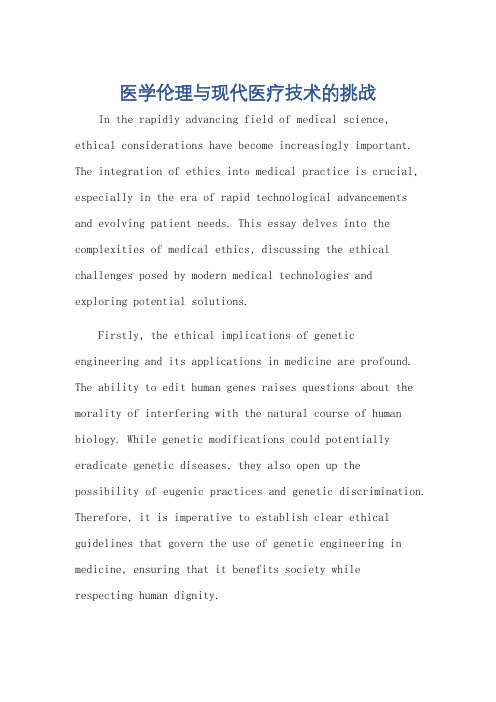
医学伦理与现代医疗技术的挑战In the rapidly advancing field of medical science, ethical considerations have become increasingly important. The integration of ethics into medical practice is crucial, especially in the era of rapid technological advancements and evolving patient needs. This essay delves into the complexities of medical ethics, discussing the ethical challenges posed by modern medical technologies andexploring potential solutions.Firstly, the ethical implications of geneticengineering and its applications in medicine are profound. The ability to edit human genes raises questions about the morality of interfering with the natural course of human biology. While genetic modifications could potentially eradicate genetic diseases, they also open up thepossibility of eugenic practices and genetic discrimination. Therefore, it is imperative to establish clear ethical guidelines that govern the use of genetic engineering in medicine, ensuring that it benefits society whilerespecting human dignity.Moreover, the rise of artificial intelligence (AI) in healthcare presents both opportunities and challenges. AI-powered diagnostic tools and robots can enhance patientcare and efficiency, but they also raise concerns about privacy, data security, and the potential for machines to replace human doctors. It is vital to strike a balance between harnessing the benefits of AI and safeguarding patients' rights and the role of human professionals in healthcare.Additionally, the ethical challenges associated with stem cell research and therapy are complex. The potentialfor stem cells to treat a wide range of diseases offershope to millions, but the ethical questions surrounding the sourcing and use of stem cells remain unresolved. Thedebate centers on the morality of using embryonic stem cells, which involves the destruction of embryos. Therefore, there is a need for ongoing ethical discussions andrigorous regulatory frameworks to ensure that stem cell research and therapy are conducted ethically and responsibly.In addressing these ethical challenges, a multi-stakeholder approach is essential. Healthcare professionals, policymakers, patients, and the general public must collaborate to shape ethical guidelines that are inclusive, equitable, and sustainable. Furthermore, medical education should incorporate ethics as a core component, preparing future doctors to make ethical decisions in their professional practice.In conclusion, medical ethics is at the forefront of modern healthcare, guiding the development and applicationof new technologies. By addressing the ethical challenges posed by genetic engineering, AI, and stem cell research,we can ensure that medical science continues to serve humanity while respecting our fundamental values and dignity.**医学伦理与现代医疗技术的挑战**在医学科学迅速发展的领域,伦理考量变得越来越重要。
医学英文论文写作方法

医学英文论文写作方法第一篇:医学英文论文写作方法医学英文论文写作方法根据医学杂志编辑国际委员会(The International Committee of Medical Journal Editors, ICMJE)制定的《生物医学杂志投稿统一要求》(The Uniform Requirements for Manuscripts Submitted to Biomedical Journals, 5th Ed., 1997)*, 一篇生物医学科研论文(以下简称“论文”)应包括以下12个部分:1.标题(Title)7.致谢(Acknowledgements)2.摘要(Abstract)8.参考文献(References)3.引言(Introduction)9.插图说明(Legends)4.材料与方法(Materials and Methods)10.插图(Figures)5.结果(Results)11.表格(Tables)6.讨论(Discussion)12.照片和说明(Plates and Explanations)以上除7、9、10、11、12部分因实际情况不需要外,其他各部分是一篇论文必不可少的内容。
1)引言部分总的要求是:The purpose of an introduction is to bring the reader into the general area of your study and then state the specific area of study(move from the general to the specific).The introduction shows the scope of your investigation efforts.** 即:说明研究的总体范围和目的。
具体内容包括:A背景–说明所研究问题的目前总体情况或历史(statement of general area or history of problem);B.意义–说明研究的意义或必要性(statement of importance or need);C.进展–说明有关该问题的先有发现、报告或研究(statement of previous findings, reports or studies)。
医学的的英语作文

医学的的英语作文Medical English Essay。
Introduction。
The field of medicine is a vast and complex one, encompassing a wide range of disciplines and specialties. From the study of human anatomy and physiology to the development of new treatments and therapies, the medical profession is constantly evolving and advancing. At the heart of this field is the need for clear and effective communication, particularly in the use of English as a global language.In the medical context, the ability to communicate effectively in English is crucial for a variety of reasons. Firstly, the majority of medical research and literature is published in English, making it essential for healthcare professionals to be able to access and understand thelatest developments in their field. Additionally, with theincreasing globalization of the healthcare industry, medical professionals often need to collaborate with colleagues from around the world, necessitating the use of a common language.Moreover, the ability to communicate effectively in English is crucial for patient care. Healthcare providers must be able to clearly explain medical procedures, diagnoses, and treatment plans to patients, many of whom may not speak the local language. Effective communicationis also essential for obtaining informed consent, ensuring patient compliance, and providing high-quality care.In this essay, we will explore the importance of medical English, the challenges faced by healthcare professionals in mastering this specialized language, and the strategies and resources available to support the development of medical English proficiency.The Importance of Medical English。
医学相关的小作文英语
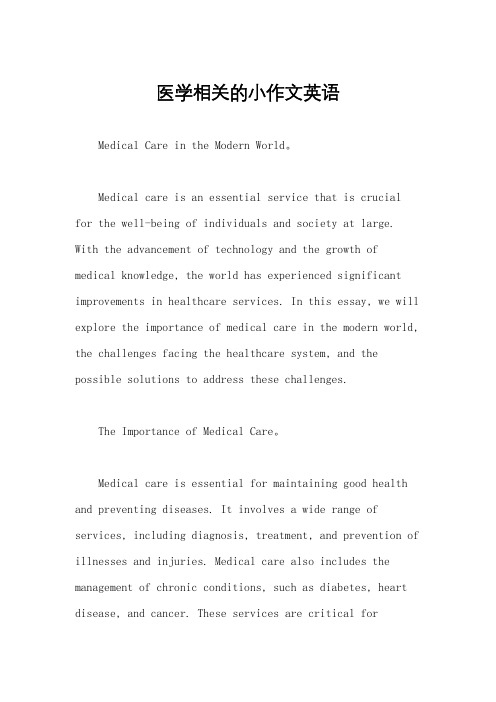
医学相关的小作文英语Medical Care in the Modern World。
Medical care is an essential service that is crucialfor the well-being of individuals and society at large. With the advancement of technology and the growth of medical knowledge, the world has experienced significant improvements in healthcare services. In this essay, we will explore the importance of medical care in the modern world, the challenges facing the healthcare system, and the possible solutions to address these challenges.The Importance of Medical Care。
Medical care is essential for maintaining good health and preventing diseases. It involves a wide range of services, including diagnosis, treatment, and prevention of illnesses and injuries. Medical care also includes the management of chronic conditions, such as diabetes, heart disease, and cancer. These services are critical forimproving the quality of life of individuals and promoting economic growth.Medical care is also important for addressing public health issues. It plays a crucial role in controlling the spread of infectious diseases, such as COVID-19. Medical care also helps to prevent the emergence of new diseases by conducting research and developing vaccines and treatments.Challenges Facing the Healthcare System。
医学英语作文
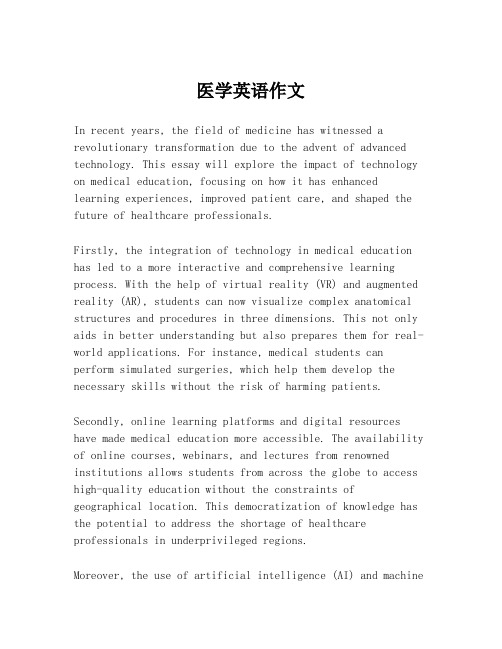
医学英语作文In recent years, the field of medicine has witnessed a revolutionary transformation due to the advent of advanced technology. This essay will explore the impact of technology on medical education, focusing on how it has enhanced learning experiences, improved patient care, and shaped the future of healthcare professionals.Firstly, the integration of technology in medical education has led to a more interactive and comprehensive learning process. With the help of virtual reality (VR) and augmented reality (AR), students can now visualize complex anatomical structures and procedures in three dimensions. This not only aids in better understanding but also prepares them for real-world applications. For instance, medical students can perform simulated surgeries, which help them develop the necessary skills without the risk of harming patients.Secondly, online learning platforms and digital resources have made medical education more accessible. The availability of online courses, webinars, and lectures from renowned institutions allows students from across the globe to access high-quality education without the constraints of geographical location. This democratization of knowledge has the potential to address the shortage of healthcare professionals in underprivileged regions.Moreover, the use of artificial intelligence (AI) and machinelearning in medical research has accelerated the discovery of new treatments and therapies. Medical students and professionals can now collaborate on a global scale, sharing data and insights to solve complex medical challenges. This collaborative approach fosters a culture of continuous learning and innovation, which is essential for the advancement of medical science.However, the reliance on technology also presents challenges. There is a concern that an over-reliance on digital tools may compromise the development of essential clinical skills, such as the art of physical examination and patient communication. To address this, it is crucial to strike a balance between technological integration and traditional teaching methods.In conclusion, technology has significantly influenced medical education by providing innovative tools and resources that enhance the learning experience. It has opened doors to a more interconnected and collaborative approach to medical research and patient care. As we continue to embrace technological advancements, it is imperative to ensure that the core values of empathy and human connection in medicine are not overshadowed. The future of medical education lies in a harmonious blend of technology and traditional practices, creating a holistic approach to healthcare training.。
医药讨论课题英文作文模板

医药讨论课题英文作文模板Title: Medical Discussion Topic English Essay Template。
Introduction:The field of medicine is vast and constantly evolving, with new research and discoveries being made every day. Asa result, there are countless topics within the realm of medicine that can be discussed and debated. In this essay, we will explore a variety of potential discussion topics within the field of medicine, and provide a template forhow to structure a thoughtful and well-researched essay on these topics.Body:I. Topic 1: The Ethics of Genetic Engineering。
Discuss the ethical implications of genetic engineering, including the potential for designer babies and themanipulation of the human genome.Consider the potential benefits and drawbacks of genetic engineering, and how it may impact society as a whole.Provide examples of current research and applications of genetic engineering in medicine.II. Topic 2: The Opioid Epidemic。
医学相关六级英语作文模板
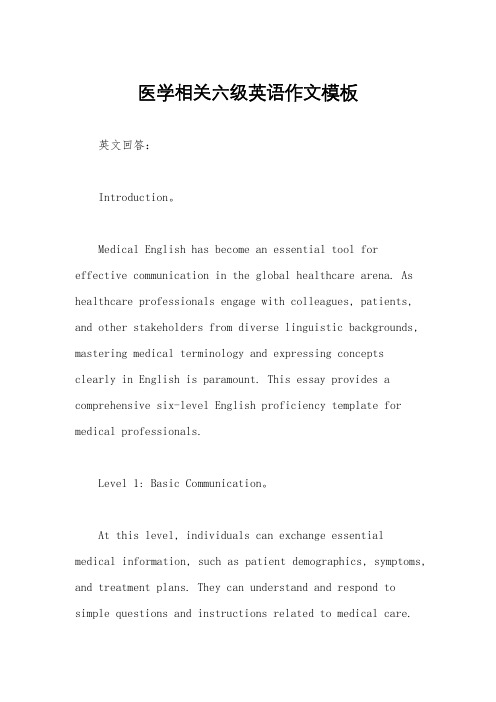
医学相关六级英语作文模板英文回答:Introduction。
Medical English has become an essential tool for effective communication in the global healthcare arena. As healthcare professionals engage with colleagues, patients, and other stakeholders from diverse linguistic backgrounds, mastering medical terminology and expressing conceptsclearly in English is paramount. This essay provides a comprehensive six-level English proficiency template for medical professionals.Level 1: Basic Communication。
At this level, individuals can exchange essential medical information, such as patient demographics, symptoms, and treatment plans. They can understand and respond to simple questions and instructions related to medical care.Key vocabulary includes:Patient history。
Physical exam。
Medications。
Nursing interventions。
Level 2: Intermediate Proficiency。
关于医学英语的作文
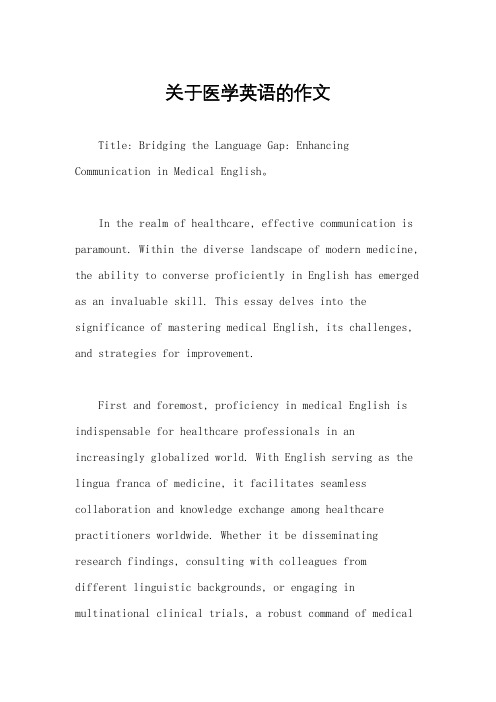
关于医学英语的作文Title: Bridging the Language Gap: Enhancing Communication in Medical English。
In the realm of healthcare, effective communication is paramount. Within the diverse landscape of modern medicine, the ability to converse proficiently in English has emerged as an invaluable skill. This essay delves into the significance of mastering medical English, its challenges, and strategies for improvement.First and foremost, proficiency in medical English is indispensable for healthcare professionals in an increasingly globalized world. With English serving as the lingua franca of medicine, it facilitates seamless collaboration and knowledge exchange among healthcare practitioners worldwide. Whether it be disseminating research findings, consulting with colleagues fromdifferent linguistic backgrounds, or engaging in multinational clinical trials, a robust command of medicalEnglish is imperative.However, mastering medical English presents its fair share of challenges. One of the primary obstacles is the specialized terminology inherent to the field. Medical jargon can be intricate and nuanced, posing difficulties even for native English speakers. Moreover, the dynamic nature of medicine necessitates staying abreast of new terminologies and advancements, adding another layer of complexity. Additionally, cultural differences and varying accents further complicate communication, potentially leading to misunderstandings and compromised patient care.To address these challenges, a multifaceted approach is warranted. Firstly, integrating medical English training into formal medical education curricula is essential. By incorporating English language proficiency modules tailored to medical contexts, aspiring healthcare professionals can develop the requisite linguistic skills early in their training. Furthermore, continuing education programs and workshops focusing on medical English can be beneficial for practicing clinicians, enabling them to refine theircommunication skills throughout their careers.Utilizing technology can also augment efforts to enhance medical English proficiency. Interactive online platforms, language learning apps, and virtual simulations offer flexible and accessible avenues for healthcare professionals to practice medical English in simulated clinical scenarios. Additionally, leveraging digital resources such as online dictionaries and glossaries can aid in navigating complex medical terminology efficiently.Moreover, fostering a culture of linguistic diversity and inclusivity within healthcare institutions is imperative. Encouraging interdisciplinary collaboration and providing language support services for non-native English speakers can cultivate an environment conducive toeffective communication. Embracing diversity not only enriches the healthcare workforce but also enhancespatient-centered care by promoting cultural competence and sensitivity.In conclusion, proficiency in medical English isindispensable for effective communication in healthcare. Despite the challenges posed by specialized terminology and cultural differences, proactive measures such as tailored education, technological innovations, and fostering a culture of inclusivity can mitigate barriers and facilitate meaningful dialogue among healthcare professionals. By bridging the language gap, we can uphold the highest standards of patient care and advance global health outcomes.。
医学相关的英文作文

医学相关的英文作文英文:As a medical professional, I believe that it is important to constantly improve our knowledge and skills in order to provide the best care for our patients. This means staying up-to-date on the latest research and techniques, as well as being able to effectively communicate with patients and their families.One way to improve our skills is through continuing education courses and conferences. These opportunities allow us to learn from experts in our field and exchange ideas with our colleagues. For example, I recently attended a conference on the latest advancements in cancer treatments. I was able to learn about new drugs and therapies that can improve patient outcomes, as well as network with other oncologists from around the world.Another important aspect of providing good care iseffective communication. This means not only being able to explain complex medical concepts to patients and their families, but also listening to their concerns and addressing them in a compassionate and empathetic manner. For example, I recently had a patient who was hesitant to undergo a certain procedure. Instead of dismissing their concerns, I took the time to listen to their fears and explain the benefits and risks of the procedure in a waythat they could understand. This helped to build trust and ultimately led to a successful outcome.In addition to continuing education and communication skills, I also believe that it is important to stay up-to-date on the latest technology and equipment. This caninclude everything from electronic health records tosurgical robots. By staying current with these advancements, we can provide more efficient and effective care for our patients.中文:作为一名医疗专业人士,我认为不断提高我们的知识和技能,以便为患者提供最好的护理非常重要。
对医学伦理的看法和建议英语作文
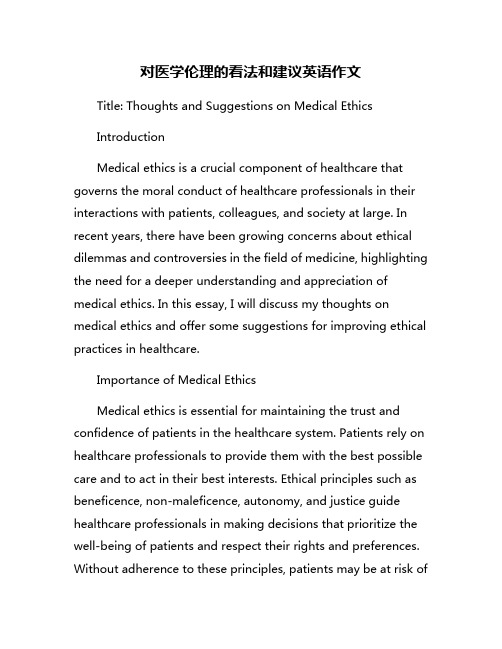
对医学伦理的看法和建议英语作文Title: Thoughts and Suggestions on Medical EthicsIntroductionMedical ethics is a crucial component of healthcare that governs the moral conduct of healthcare professionals in their interactions with patients, colleagues, and society at large. In recent years, there have been growing concerns about ethical dilemmas and controversies in the field of medicine, highlighting the need for a deeper understanding and appreciation of medical ethics. In this essay, I will discuss my thoughts on medical ethics and offer some suggestions for improving ethical practices in healthcare.Importance of Medical EthicsMedical ethics is essential for maintaining the trust and confidence of patients in the healthcare system. Patients rely on healthcare professionals to provide them with the best possible care and to act in their best interests. Ethical principles such as beneficence, non-maleficence, autonomy, and justice guide healthcare professionals in making decisions that prioritize the well-being of patients and respect their rights and preferences. Without adherence to these principles, patients may be at risk ofharm or exploitation, leading to a breakdown in thepatient-provider relationship.Furthermore, medical ethics plays a crucial role in promoting professionalism and integrity among healthcare professionals. By upholding ethical standards, healthcare professionals demonstrate their commitment to ethical behavior and accountability, which are essential for maintaining the credibility and reputation of the healthcare profession. Ethical conduct also fosters a culture of respect, honesty, and empathy in healthcare settings, creating a positive and supportive environment for patients and healthcare providers alike.Challenges and ControversiesDespite the importance of medical ethics, healthcare professionals often face ethical dilemmas and complexities in their daily practice. Ethical issues such as informed consent, end-of-life care, confidentiality, conflicts of interest, and resource allocation can test the moral compass of healthcare providers and challenge their ability to make decisions that align with ethical principles. In addition, advancements in medical technology and research have raised new ethical concerns, such as genetic testing, gene editing, and artificial intelligence inhealthcare, which require careful consideration and ethical oversight.In recent years, there have been several high-profile cases of ethical misconduct and breaches of trust in healthcare, including scandals involving research misconduct, fraud, and abuse of power. These incidents have eroded public confidence in the healthcare system and raised questions about the effectiveness of ethical oversight and regulation in the field of medicine. It is essential for healthcare organizations, regulatory bodies, and professional associations to take proactive measures to address ethical lapses and prevent future ethical violations through education, training, and enforcement of ethical standards.Suggestions for ImprovementTo enhance medical ethics in healthcare, several strategies can be implemented to promote ethical behavior and improve ethical decision-making among healthcare professionals. First and foremost, healthcare providers should receive comprehensive training in medical ethics and be provided with ongoing support and guidance on ethical issues in clinical practice. Ethical education should be integrated into medical school curricula, residency training programs, and continuingeducation courses to ensure that healthcare professionals are well-equipped to navigate ethical challenges in their practice.Second, healthcare organizations should establish robust ethical frameworks and policies to guide ethical decision-making and promote a culture of ethics and integrity within the organization. Ethical codes of conduct, clinical guidelines, and policies on informed consent, confidentiality, conflicts of interest, and end-of-life care should be developed and enforced to ensure that healthcare providers adhere to ethical standards and practices. In addition, ethics committees and consultation services should be available to assist healthcare providers in resolving ethical dilemmas and conflicts in a timely and ethical manner.Third, patients should be actively engaged in discussions about medical ethics and encouraged to participate in decision-making processes related to their care. Shared decision-making, respect for patient autonomy, and open communication are essential components of ethical healthcare practices that empower patients to make informed choices about their treatment and ensure that their values and preferences are respected. Healthcare providers should respect the autonomy and dignity of patients and involve them indiscussions about treatment options, risks, benefits, and alternatives to ensure that they receive patient-centered care that is aligned with their values and goals.ConclusionIn conclusion, medical ethics is a fundamental aspect of healthcare that guides the moral conduct of healthcare professionals and promotes the well-being and rights of patients. To uphold ethical standards and practices in healthcare, it is essential for healthcare providers, organizations, and regulatory bodies to work collaboratively to address ethical challenges, promote ethical behavior, and protect the interests of patients. By prioritizing ethical education, training, and support for healthcare professionals, we can ensure that ethical principles are upheld in clinical practice and that patients receivehigh-quality, compassionate, and ethical care. By embracing ethical values and principles, we can build a more ethical and patient-centered healthcare system that promotes trust, integrity, and respect for all individuals involved in healthcare.。
- 1、下载文档前请自行甄别文档内容的完整性,平台不提供额外的编辑、内容补充、找答案等附加服务。
- 2、"仅部分预览"的文档,不可在线预览部分如存在完整性等问题,可反馈申请退款(可完整预览的文档不适用该条件!)。
- 3、如文档侵犯您的权益,请联系客服反馈,我们会尽快为您处理(人工客服工作时间:9:00-18:30)。
Permanent implantation of electrodes was thus necessary to achieve reproducible recordings in our study.
Step Four of Move 2
It compares and contrasts our new
Three Moves
Highlighting the overall research
outcome
Explaining specific research outcomes Stating research conclusions
Move 1 Highlighting the overall research outcome Move 1 of the discussion is often an explicit affirmation that the researchers performed the experiments that they set out to perform, or answered their research question.
主要回答在introduction部分提出的科学问 题,以及主要支持的论据
●
Our data support the hypothesis that taking aspirin or other non-steroidal antiinflammatory drugs protects against the development of colorectal cancer and suggest that it does so by reducing the prevalence of colorectal adenomas.
●
Move 3
In clinical papers, there will be a statement of the implications for patient care.
●
The measures used in our study may help to identify treatment methods that...
Move 1 Sentence Patterns
This study investigated the effect of... on ...
This study investigated the effectiveness
of... in [verb] + ing
●
This study investigated the effect of a community-based educational program on quality of life among patients suffering from Parkinsonism.
Move 2 Explaining specific research outcomes
Move 2 of the discussion is much more
extensive, reviewing and explaining the
results in detail.
Five Steps of Move 2
program can improve the quality
of life of patients with Parkinsonism.
(present tense)
Step Two of Move 2 It is an explicit statement of the significance of the results.
Discussion
The discussion may be the most
challenging part of the paper to write since we have to make sense of results which are seldom exactly as anticipated.
including external validity.
●
Some limitations of the current study are the
relatively small sample size and ...
Move 3 Stating research conclusions
●
In summary, the spinal cord undergoes viscoelastic relaxation during sustained compression.
Discussion
In order to avoid difficulty, the discussion
should focus on the results of the current study and not extrapolate too broadly. An effort must be made to relate the findings of the current work to established knowledge and current theories. This is where the average reader looks for value -- in the synthesis of new information to create a broader understanding of a particular area of science.
Step Four of Move 2 This comparison is a crucial step in demonstrating how our study contributes to the common body of knowledge. It essentially justifies the performance of the research (and publication of the paper), and may represent a particularly vulnerable point for clinical studies.
in those we have cited.
Step One of Move 2
It is a reiteration of the main observations.
the structure [verb] + that ...
●
This study found that a community-based
It is a reiteration of the main observations. It is an explicit statement of the significance
of the results.
It justifies the results by confirming that the
●
The importance of these findings is that ... A significant outcome of this study is that…
●
(present tense)
Step Three of Move 2
It justifies the results by confirming that the methods were appropriate to the research question.
methods were appropriate to the research question.
It compares and contrasts our new results
with those of previous studies.
It discusses the limitations in our paper and
●
In conclusion, the significance of this study is that ...
Move 3 This move most often provides the “yes or no” answer to our hypothesis, or makes the definitive statement about what the study has achieved. There is likely to be a statement of research questions which arise from this study, and therefore suggestions for further research. What needs to be investigated further is whether or not ...
educational program improved the quality of
life of patients with Parkinsonism.
(past tense)
Step One of Move 2
●
These findings suggest that a
community-based educational
Model British Medical Journal, Logan et al.1993 ① Main information
② Critical assessment
③ Comparison with other studies
④ Conclusion
Model ① Main Information (主要信息)
